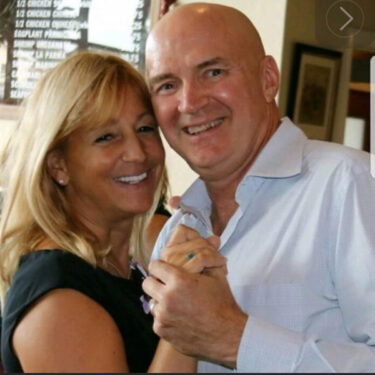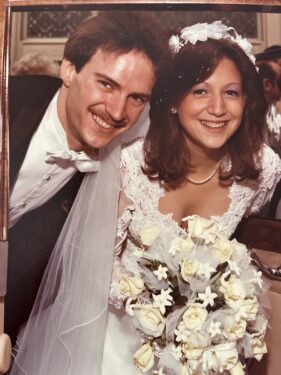
QUEENS VILLAGE — Angel Pipitone-Coen and her husband John Coen were high school sweethearts from Queens Village who married in 1984. But in 2011 — 27 years after they said their I do’s — their marriage was falling apart. John filed for divorce, and both he and Angel prepared to go their separate ways.
As a last-ditch effort to save the marriage, they went on a retreat hosted by Retrouvaille International, a non-profit organization endorsed by the Catholic Church that helps couples in crisis. The Coens, who now live on Long Island, repaired their damaged relationship and are still married today.
Their story is one of coming apart and then coming back together.
Angel and John both attended Our Lady of Lourdes Catholic school in Queens Village as children but didn’t know each other back then.
They met in high school. “I was a sophomore. He was a senior,” Angel, 61, recalled.
“A good friend of mine was dating Angel’s sister, and he said to me, ‘I want you to come over. Janice has a cute sister, and I want you to meet her.’ That was Angel. We started dating, and then about six years later, we got married. So we’re true high school sweethearts,” said John, 63.
They were married in 1984. The marriage seemed blissful for 20 years or so, but in the mid-2000s, they grew tired of each other and argued a lot. As a result, they started spending less and less time together.
“We were living the married but single life,” John recalled. “I was doing my own thing. She was doing her own thing. Then, it reached the point where I filed for divorce. I was done. I moved out of the house.”
Angel was upset by the sad turn their once-loving relationship had taken. “I was crying. I was praying,” she said.
But John realized that he wasn’t quite ready to call it quits. He heard about Retrouvaille, which in French means reunion, and decided to give it a try. Angel was reluctant at first, but he managed to talk her into it.
“It was a life-changing experience for us,” Angel says, recalling the help she and her husband received, which included tips on how to communicate better and avoid relationship pitfalls.
The program consists of three parts — a retreat weekend, 12 post-retreat sessions, and a monthly support group. The retreat weekend, usually held at the Seminary of the Immaculate Conception in Huntington, consists of “presenters,” couples who have been through the program, and a priest talking to the attendees. The presenters tell the stories of their marriages.
John recalled the weekend he and Angel spent in 2011 as two people with a fractured relationship seeking healing.
“Hearing other couples talking about their very personal stories about their own crisis was eye-opening for me. These people had gotten to a point where they could forgive each other and rebuild their marriage. That was transformative — that they could make things work out and move beyond whatever their crisis was,” he said.
Angel had a revelation that fateful weekend as well. “I learned that love is a decision. It’s not just a set of emotions. You can decide to save your marriage,” she explained. “I really do feel that God led me to do this program and to look at my marriage differently.”
Today, Angel and John feel their relationship is stronger than ever. “We are certainly closer than we’ve ever been,” Angel said.

The Coens were so impressed with the organization they became involved with Long Island/Metro New York Retrouvaille, the group’s local entity serving the five boroughs, Long Island and New Jersey. Now, the couple are presenters.
“It’s a peer-to-peer experience,” Angel said. “We don’t lecture people. We give them tools to improve their relationships.”
Mary Ginnane, a coordinator for Long Island/Metro New York Retrouvaille, is also a “graduate” of the program, having gone through it with her husband, Kevin. The Ginnanes have been involved with the program for 20 years. Mary estimated that the local group has helped 2,000 couples over the years.
“I’ve seen miracles happen,” Mary said. “Couples come in on Friday, barely looking at each other. And they leave on Sunday holding hands, talking again, smiling, hugging, and kissing.”
For married Catholic couples going through rough patches, the Church is there to help. Retrouvaille is just one of the programs the Diocese of Brooklyn recommends to couples seeking assistance.
Another program, Refoccus, uses a “marriage enrichment inventory,” a series of questionnaires that husbands and wives fill out separately and then go over with a trained facilitator.
Refoccus is part of Foccus Marriage Ministries. Foccus stands for Facilitate Open Couple Communication Understanding and Study.
“When they finish the questionnaire, a report is generated, and it is sent to the facilitator,” said Christian Rada, director of Marriage, Family Formation and Respect Life Education for the diocese. “The facilitator, with the couple, meet either in the rectory, parish office, or wherever it may be [and] simply discuss their answers together.”
Refoccus is a way for couples to address issues affecting the relationship, and it helps couples come up with ways to move forward, Rada explained.
“These are people who don’t want to go down the road to divorce because they feel that there is something left there to be saved,” he added.
Refoccus also sponsors weekend retreats where couples can work with facilitators to improve their relationships.
Rada, who is a trained Refoccus facilitator, said that many, but not all, priests in the diocese are trained in the program.
In some cases, the couple needs professional help. In those instances, Rada recommends a website called catholictherapists.com, where couples can find a therapist.
The Catholic Church discourages divorce. In the Catechism, divorce is described as “a grave offense against the natural law.”
However, divorce does happen among Catholics, even if not as frequently as in the general population. According to the U.S. Centers for Disease Control and Prevention, 44% of all U.S. marriages ended in divorce in 2019. But the divorce rate among Catholics was much lower — 19% — according to the Pew Research Center.
Rada said there are many reasons couples turn to the Church for help.
“The biggest issues that we’ve encountered, especially during Refoccus, are communication skills, problem-solving skills, and religion and spirituality. And then fourth would be financial issues,” he explained.
There are also unusual reasons as well, Rada added, citing instances in which couples have fought over the custody of pets.
He said all of the programs have a common goal, to help the couple “re-establish their relationship as a living body and a living embodiment of the Holy Spirit.”
Sometimes, couples get into trouble because they don’t understand exactly what marriage is.
The diocese’s pre-Cana program, required for all couples seeking to get married in the Catholic Church, tries to give them a clear understanding of the meaning of their wedding vows, Rada said.
“Our Pre-Cana program really strives on giving couples the ability to get the skills that they need, in order to communicate, but also to figure out exactly what you are stepping into,” he explained. “There’s a theological dimension. There is a difference between the covenant that you’re entering into with God and each other versus the signing of a document with the justice of the peace in the city clerk’s office.”
Marriage is a sacrament that mirrors “the love that Christ has for the church,” explained Father Joseph Gibino, vicar for Evangelization and Catechesis for the diocese. “And that comes directly from St. Paul, when St. Paul writes that the husband is to love his wife, as Christ loves the Church.”
But while Father Gibino said the church “is always going to always defend the sanctity of the sacramental marriage,” he added that annulment is possible.
“What the annulment recognizes is that one or both of the members of the couple did not truly enter freely into the sacrament,” he said. “What that really means is that no sacrament took place.”
If one partner enters the marriage without being truthful with their spouse about a vitally important manner — such as hiding a crime or an addiction of some sort, according to Father Gibino — it could be grounds for annulment.
According to the website Catholic.com, domestic violence is not, in itself, grounds for annulment.
But if the violence took place around the time of the wedding vows or before, and the abused partner felt threatened, the church would view that as a situation in which the abused partner did not enter into the marriage of free will, and an annulment might be possible.
Annulment could also be granted if a spouse hid a history of domestic violence or substance abuse from the partner at the time the wedding vows took place.
And while Retrouvaille strives to help most couples, there are some situations where a marriage is truly in crisis — situations involving domestic abuse or substance abuse, for example — and it would be better to seek assistance from other resources, the Coens explained.
In those cases, Retrouvaille refers the couple to abuse prevention centers or programs like Alanon and Alcoholics Anonymous. “We’re not qualified to help in those cases,” Angel told The Tablet.
Father Gibino said it’s important to look at marriage “as a covenant relationship” that is different from other sacraments.
“The couple actually confers the sacrament on each other,” Father Gibino explained. “Usually, it is the minister, a priest or deacon … that confers the sacrament. But in the sacrament of marriage, the couple confers the sacrament on each other. And the priest is the official witness.”
